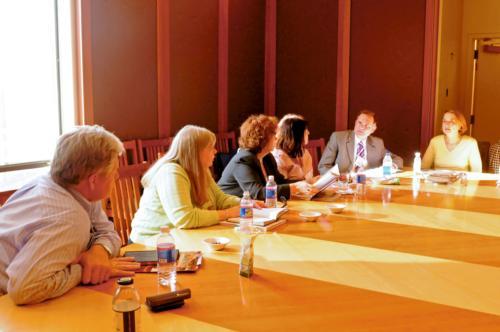
News
When Professors Speak Out, Some Students Stay Quiet. Can Harvard Keep Everyone Talking?

News
Allston Residents, Elected Officials Ask for More Benefits from Harvard’s 10-Year Plan

News
Nobel Laureate Claudia Goldin Warns of Federal Data Misuse at IOP Forum

News
Woman Rescued from Freezing Charles River, Transported to Hospital with Serious Injuries

News
Harvard Researchers Develop New Technology to Map Neural Connections
HUDS Seeks Student Input

Over sticky buns and Tropicana Immunity Defense Orange Juice, the Harvard University Dining Services (HUDS) Advisory Council’s subcommittee on residential dining met yesterday with students in Quincy dining hall as part of the annual three-day survey of HUDS operations.
The committee wanted to “pick [the] brain” of student opinion toward menu changes, broader program adjustments, and sustainability, according to committee chair Karen R. Cosgrove.
In speaking with students in dining halls since Wednesday evening, many of the council members found that students prioritize food quality over sustainability, according to council member Dean A. Wright, director of Brigham Young University Dining Services.
“Sustainability is definitely an ideal we should be striving for,” said HUDS Student Advisory Council member Peter G. Bacon ’11. “But quality should be our primary goal when dealing with HUSDS.”
Though sustainability and food quality are not mutually exclusive, Bacon said, HUDS may have to sacrifice pursuing sustainability in order to maintain food quality.
The committee discussed student perspective on sustainability as a long-term issue.
But Undergraduate Council President Matthew L. Sundquist ’09, one of the three student representatives at the meeting, said institutional memory can be difficult to establish given the typical four-year college career.
“The easiest way to mitigate that is to ensure that there is transparency in terms of those decisions being made,” Sundquist said.
Clear communication between HUDS and students about impending changes would most likely elicit positive student response, Bacon said.
A February uproar about HUDS performance over House e-mail lists came soon after unexpected menu changes in the dining halls.
In addition to sustainability issues, the advisory group discussed the revision of HUDS surveys and menu changes arising from higher food costs.
According to Cosgrove, HUDS is “very approachable” and desires student input and questions.
Council member Peg Lacey, national market manager for the food management software company CBORD, said that it is unusual for a university dining service to welcome so much scrutiny.
“For a department to be willing to open up and allow dissection for 48 hours is pretty amazing,” Lacey said.
—Staff writer Esther I. Yi can be reached at estheryi@fas.harvard.edu.
Want to keep up with breaking news? Subscribe to our email newsletter.
